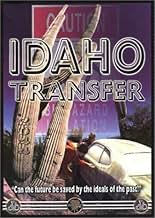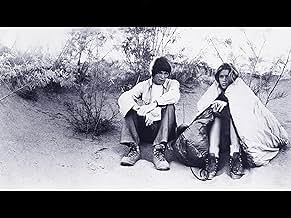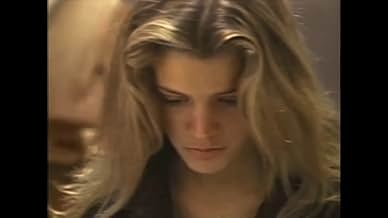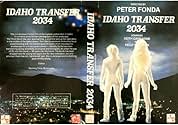Scientists at a government-funded research complex use a time machine they developed to secretly 'transfer' young researchers fifty-six years into the future after they discover Earth is soo... Read allScientists at a government-funded research complex use a time machine they developed to secretly 'transfer' young researchers fifty-six years into the future after they discover Earth is soon to suffer a worldwide disaster.Scientists at a government-funded research complex use a time machine they developed to secretly 'transfer' young researchers fifty-six years into the future after they discover Earth is soon to suffer a worldwide disaster.
- Karen Braden
- (as Kelley Bohanon)
- Elgin
- (as Roy Ayers)
- Judy
- (as Judy Motolsky)
Featured reviews
Unfortunately the interesting ideas are executed sloppily, as the screenplay is underdeveloped and director quite doesn't manage to tie everything together leaving many blanks unfilled. As most of the cast were not professional actors the acting is uneven and occasionally wooden, but it is compensated by gorgeous cinematography and scenery shots.
By far not the greatest science-fiction movie by the icon of counterculture and indi filmmaking, but original and interesting enough to give it a shot.
IDAHO TRANSFER is a curious little item made under obvious financial constraint by some of the era's more adventurous personages on the indie film-making fringe. Though mostly off-target, it does benefit from capable direction, an intriguing premise, and a clever, trenchant conclusion.
This isn't your run-of-the-mill science-fiction story, nor is it a wonderwork of special effects wizardry. It's a subdued film...an earthy, phlegmatic "anti-Hollywood" undertaking which had the potential to materialize as something greater than it is. Sadly, the feeling is more of indifference than enthusiasm at the pith of this project. By and large, IDAHO TRANSFER feels like a vague transparency of what it intended to be...the film's concrete-minimalist iconography is utterly de-trop, as is the intentional and somewhat dissociative impassivity of the cast. They approach their roles with, presumably, veristic inspiration...that method of "non-acting" which aims to italicize a mien of hyper-realism. The poker-faced performances in play could only be called "realistic" if reality was a world full of freshly lobotomized potheads with a collective Asperger-ish countenance. There's an irony here, however...oddly enough, the aforementioned shortcomings also give rise to a unique atmospheric carriage of cold austerity. It is this air of encircling paucity and lost, lonely detachment which gives IDAHO TRANSFER an interesting singularity of sorts. It's a misfire, more than not...but to its credit, it's a misfire comparable to little else.
5/10.
"Idaho Transfer" is riveting because it is filled with unpredictable and unexpected moments. It is a cross between an idiotic mess and a brilliant masterpiece (a veritable vision). Personally, I thought it was one of the most realistic time travel flicks I have seen. I give it high praise for bringing believability to the time travel concept. The time machine itself was designed by scientists and created in a realistic-looking laboratory environment. Traveling through time in said machine was not "smooth sailing" -- there were bugs in the machinery (it was the '73 Chevy Nova of time machines), but bugs there SHOULD be in such a complex machine! Fascinating is the quick transformation from advanced civilization to the primal lava/desert future. Intense was the ending, with a final few minutes so much more exciting and interesting than the ending to a low budget flick has a right to be. The final scene brings the whole idiotic mess/brilliant vision together in a way that nobody could possibly expect. Then, just when you wonder if the ending is one of the stupidest you've ever seen to a film, you give it a second thought and realize -- "Hey, what a 'wild' and 'far out' ending! We've not come too far since caveman days, and we've not too far to go to get to the point where we will think that 1973 was prehistoric times." Maybe we are already at that point?
When I sat myself down to watch "Idaho Transfer" my expectations were very low -- I expected to be left with an empty feeling. This film far exceeded my expectations and was literally fueled with dynamism right up to the bitter end.
The film is directed by Easy Rider star, Peter Fonda, and to be fair; he does quite a good job. Fonda creates a good impression of a post-apocalyptic world. The environments are always desolate, and create a sense of hopelessness in the viewer. It's just unfortunate that the plot is desolate also. Peter Fonda doesn't appear in front of the camera and the lead role goes to Kelly Bohanon. None of the cast really stands out, and Bohanon is no different. Keith Carradine is the only name I recognise on the cast list and his performance is nothing special. To be honest, I've never been a big fan of seventies Sci-Fi; it doesn't age well, and these days the 'futuristic' computers look like they wouldn't be out of place in the Stone Age. I can't really say that it's a shame this film isn't very good; it hasn't got a great deal going for it anyway, but it definitely could have been a bit better, and its poor plotting that has made it lose out at the end of the day. I can't really say that there's anything to recommend this film for, and as it's not easy to come by; I don't recommend going out of your way to find a copy.
Did you know
- TriviaThe film was released theatrically in 1973 for only a limited time, as the distributor, Cinemation, went bankrupt during the first week the film was released. Only in 1988 did the film resurface on video, through MPI Home Video. Only this version has Peter Fonda's opening remarks about the environment. Subsequent DVD releases do not include this.
- GoofsWhen Karen returns to the camp to find everyone dead, in the establishing shot her face is caked with dirt, but in subsequent close-ups, and all other shots, her face is clean.
- Quotes
Future Girl: Are you sure that was one of them?
Future Woman: Of course it was.
Future Girl: What happens when we run out?
Future Woman: We just put another one in. We won't need another for quite a ways.
Future Girl: I didn't mean that. I meant, what if we run out of all of them or we can't even find any?
Future Man: They'll figure out another way for us.
Future Woman: We can use something else.
Future Girl: But what if that's too hard or expensive and what if they decide they can't change? We'll use each other then, won't we?
- Crazy creditsEsto Perpetua
- Alternate versionsVideo has a 1988 introduction by Peter Fonda speaking about environmental awareness.
- ConnectionsReferenced in My Own Private Idaho (1991)
- How long is Idaho Transfer?Powered by Alexa
Details
- Release date
- Country of origin
- Language
- Also known as
- Expedition in die Zukunft
- Filming locations
- Production companies
- See more company credits at IMDbPro
Contribute to this page






















